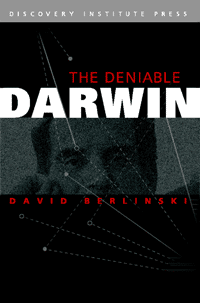
NewsBusters has a great interview with David Berlinski by Kevin Mooney, who praises The Deniable Darwin as “a series of mind-bending essays.” Proving once again that he is a skeptic’s skeptic, Dr. Berlinski addresses the lack of criticism in science:
“In the U.S. you have the separation of powers that keeps different branches in check, but this is not true for science, where there is now a lot of corruption,” he observed. “Science needs its own critics. The same skepticism that is used in research now needs to be turned back onto science itself.”
Dr. Berlinski’s essays go a long way toward rectifying this situation, while his observations and insights quickly reveal how ridiculous the anti-ID crowd can be:
But there is nothing wrong in principle with scientific endeavors that are infused by faith and a sense of humility toward larger possibilities, Berlinsk said.
“We are not going to adopt sharia law because an astronomer who is open to these ideas begins to make important discoveries,” he observed.
It’s an obvious point, but if you remember the irrational fear surrounding the tenure case of textbook-author Guillermo Gonzalez, it’s apparently a point that still needs to be made.
The rest of the interview is available here.